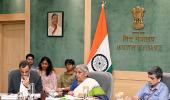Payouts to key management personnel in non-banking financial companies (NBFCs) are under the banking regulator’s scrutiny. Top industry officials said this is a follow-through on the Reserve Bank of India’s (RBI’s) circular of April 29, 2022, which asked NBFCs in the “middle” and “upper” layer of its four-tiered scale-based regulatory (SBR) framework to put in place a board-approved compensation policy.

These include the setting up of a remuneration committee, principles for fixed-variable pay structures, and claw-back provisions effective April 1 last year.
The RBI’s annual report for FY24 also makes it explicit that among its key regulatory and supervisory deliverables for the next year will be “delineating the role of various committees” (audit committee of the board, nomination and remuneration committee, and risk management committee) in NBFCs as mentioned in the scale-based regulatory framework issued on October 22, 2021.
A key feature of the exercise will be adherence to norms on the proportion of variable pay in total compensation.
The RBI had said that the proportion of variable pay needs to be higher towards the top of the pyramid.
And that there is to be a balance between the cash and share-linked instruments in the variable pay in case the latter included share-linked instruments.
“The variable pay should be truly and effectively variable and can be reduced to zero based on performance at an individual, business-unit and company-wide level. In order to do so, performance measures and their relation to remuneration packages should be clearly defined at the beginning of the performance measurement period to ensure that the employees perceive the incentive mechanism,” said the RBI.
Another aspect that is to kick in is that not all the variable pay awarded after performance assessment may be given immediately.
A certain portion of variable pay is to be deferred to the time horizon of the risks.
The portion of deferral arrangement may be made applicable for both cash and non-cash components of the variable pay.
The RBI’s four-tiered SBR approach was to cut out arbitrage between banks and NBFCs, detrimental to the orderly growth and systemic stability.
The layers being: “base” (NBFCs with assets Rs 1,000 crore and below); “middle” (assets of Rs 1,000 crore and above); “upper” (to be specifically identified); and “top” (to be left empty, unless the banking regulator feels an NBFC poses potential systemic risk).
The idea behind this architecture is that it enhances transparency and governance while not burdening them with higher-level regulations.
As on September 30, 2023, NBFCs in the “base”, “middle” and “upper” layers constituted six per cent, 71 per cent and 23 per cent of the total assets of NBFCs, respectively.
It is being surmised the RBI may be preparing some of the large NBFCs for life as banks sometime later.
The guidelines on ‘Compensation of Key Managerial Personnel (KMP) and Senior Management in NBFCs’ issued on April 20, 2022 brings NBFCs in the “middle” and “upper” layer of its SBR framework on par with private banks’ senior management.
It may be recalled that RBI’s Internal Working Group (IWG) to ‘Review the extant ownership guidelines and corporate structure for private banks’ had on November 20, 2020 made a case for large corporate and industrial houses as promoters of banks.
And also large NBFCs with an asset size of Rs 50,000 crore and above (including those owned by corporates, may be considered for conversion into banks.
The trigger for setting up the IWG was “in alignment with the agenda set for the economic growth of the country to become a $5-trillion economy, there are heightened expectations for the banking sector to scale up for a greater play in the global financial system.”
The RBI had accepted 21 of the IWG’s 31 recommendations.
It had also said that “the remaining recommendations are under examination” in its press release of November 26, 2021.
This was read by private bank license hopefuls among NBFCs to mean that the issue is still open.
The grapevine has it that a few large NBFC are once again weighing their bank licence ambitions now that the merger of the HDFC twins is through.












 © 2025
© 2025